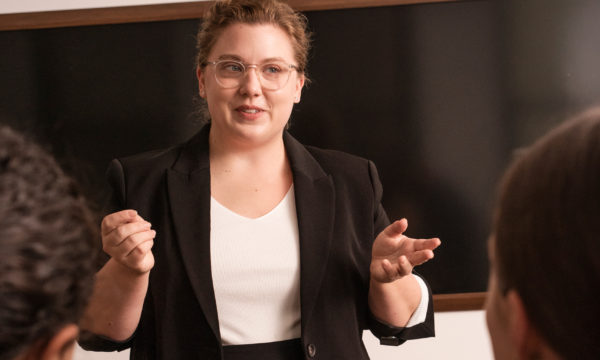How Women Really Say No at Work
April 21, 2016
“I’m really good at saying no,” says almost no one, with the rare exception of my friend Alice, who used these exact words two weeks ago while she stood in her kitchen, calmly slicing ginger. A registered nurse who specializes in adolescent health, Alice works primarily with teens at high risk for unplanned pregnancy and STDs; she got her medical degree at Penn, has delivered babies in developing countries, won a grant to administer IUDs to women who can’t afford them, and is generally not to be messed with. I’d always assumed she was born putting her foot down.
And yet, when I asked Alice where she’d honed her naysaying ability, she cited the job she’d gotten right after college—a sales position at a media-intelligence company, of all places. “The first winter I worked there, my car got broken into one morning, so I called my boss, Dan, and started apologizing and asking permission to get it fixed,” she recalled. “He stopped me mid-sentence and instructed me to say, ‘Dan, my car was broken into. I am going to get it fixed. I’ll work from home today and see you tomorrow.’” Dan empowered Alice to set boundaries within the office as well; she credits him for her eventual decision to quit the corporate world and go into healthcare. Today, she’s so unbothered by saying no that colleagues often ask her to do it on their behalf.
But Alice is a rainbow-striped unicorn when it comes to the yes-no conundrum. Most people, particularly at the beginning of their careers, are expected to do what they’re told in the workplace; uppity talk of personal needs makes them look entitled at best and weak or lazy at worst. Plus, there’s the very real obligation to prove your worth. “When I first started out, I’d pile on whatever was given to me and stress out to get it all done,” said Leandra, who holds a senior position at one of New York’s top interior design firms. “It’s important to earn your spot, but experience gives you the confidence to say no, and nowadays I try to do so as quickly as possible so that the delegator can find someone else.”
Moreover, it’s natural to want to say yes—to your boss, a colleague’s assistant, that random person’s nephew who wants job advice, or the confused stranger seeking the nearest Starbucks outside your office. To say yes is to affirm your own power, utility, and authority. Yes, you are equipped to help, open to new people and ideas, ready to embrace all possibilities! And for the same reasons that saying yes feels good, saying no is innately uncomfortable, tinged with rudeness and rejection. It can feel confrontational, even when it’s not. Many super-successful people hire assistants, publicists, or chiefs of staff for that very reason—to have a gatekeeper to say no so they don’t have to.
Being your own gatekeeper takes discipline and self-awareness. You can’t blow off an important phone call because you’d rather finish your sandwich, but you do need to eat; it’s a constant seesaw of pros and cons. “I don’t like saying no, and I rarely do,” said Samantha, who founded a New York-based startup three years ago (it became profitable last month). As a result, she has to contend with a constant stream of entrepreneurs, investors, clients, nonprofits, and potential collaborators beating down her door. “I have to ask myself, ‘Am I the best person to meet with them?’ And if so, ‘When?’” she explained. “If I don’t have time, I usually connect them with someone else on my team. I try to stick to the rule of no more than two investor meetings per day. It can be exhausting.”
Exhaustion was exactly what Nancy felt a few months after she got a big promotion at the software company where she works. “I was working crazy hours, and beginning to sour on my job,” she told me last week. “I talked to a mentor who once held the same position, and she said she was able to stay engaged and happy by saying no on a more regular basis.”
A breaking point, whether it’s full-body burnout or garden-variety misery, can prod people towards playing hardball—which comes with its own set of risks. “My first-ever boss was a tyrant,” recalled Harriet, an editor. “After a year of eagerly saying yes to everything (including dressing like a superhero to ‘surprise’ a client we were pitching—we didn’t get the account), I learned that I needed to start setting boundaries.” When her boss asked her to oversee yet another project on top of her unmanageable workload, Harriet told him that she physically couldn’t. “He was outraged and called me at 7am to bawl me out. Our compromise: I took a pay cut, but became stricter about what my job did and did not entail. For me, it was a temporary win. (The bigger win was when I finally quit that job.)”
Everyone agrees: Saying no should be a quick affair. “I try not to let myself word vomit,” said Dana, the head of product at a digital startup. “I used to beat around the bush, but now I force myself to stop speaking after a few sentences, max.” Over-explaining can make you vulnerable to pushback—or eye-rolls. “I turned down a speaking engagement because it was right before my wedding,” said Nancy. “I don’t regret saying no, but the wedding came off as a pretty lame excuse, particularly to some of my male colleagues.” Amy, the chief marketing officer of a fashion brand, adds, “Trying too hard to soften the blow ends up making it more awkward than it needs to be. If you treat people like reasonable adults, they’re more likely to respond like one.”
In a perfect world—and according to dozens of self-help books on the subject, including William Ury’s widely-recommended The Power of a Positive No—the word should be followed with an alternative solution. Sylvia, a managing editor at a monthly magazine, always makes her counter-offers as specific as possible. “People respect clarity,” she said. “If you don’t want to answer emails past a certain hour, say, ‘I am unavailable during these times, but I would happy to talk to you at X o’clock on Monday.’ Give them the next-best thing, and keep emotion out of it.” If that doesn’t work, she’ll quantify the negative repercussions of what’s being asked. “I’ll say something like, ‘If you choose to do this, it will cost you this much more, and we will have to hire more freelancers,’” she continued. “Honestly, it never works to make statements about your well-being. If you complain about staying late or working over the weekend, then you just look uncooperative. It conveys a matter of will instead of a matter of ability.”
I’m sorry to say it, but every single woman I spoke to admitted that she still apologizes about saying no, despite entreaties by everyone from Amy Schumer to Pantene to cut it out. (Personally, I’ll confess that it’s a self-serving reflex—it makes me feel better, and it prompts the person on the receiving end to tell me it’s okay.) “I’m trying to be better about eradicating ‘I’m sorry’ from the no in most of my professional interactions, but it’s tough,” said Genevieve, a retail market manager at an international chemical company. “I don’t ever hear my male colleagues do it.” Added Leandra, “I’ll try to say, ‘Thanks for your help today,’ instead of ‘Sorry I couldn’t be there.’ I’ll want to apologize, but that just gives the impression that maybe I could have done it.”
As for the gender question: There are countless articles about why women have more trouble saying no than men, but this isn’t one of them. When I consulted both men and women about doing so in the workplace, responses ranged equally from “I’m terrible at it” to “I’m getting better.” But while the discomfort of saying no may be similar across genders, some women mentioned a noticeable discrepancy. “It seems that women colleagues will take my no at face value, whereas men will check twice or even three times before accepting it as the final answer,” said Nancy.
Of course, no matter how fairly and professionally you turn them down, people will occasionally be assholes about it. Recently, my friend Lisa, an actress, politely (and reasonably) declined her director’s last-minute request that she perform in fewer shows than they’d originally agreed upon. “The hardest part of saying no was that I wanted to add a ‘fuck you’ and delineate exactly why his request was so outrageous, but I guess that is what therapy is for,” she told me. She then forwarded me the response he sent her: “I received your emphatic no.. [sic] Think about it please.”
All names have been changed.









